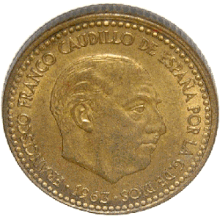
Back كوديلو Arabic Kaudilo Azerbaijani Cabdill Catalan Caudillo German Kaŭdilo Esperanto Caudillo Spanish کادیو Persian Caudillo Finnish Caudillo French קאודיו HE
This article may require copy editing for grammar, style, cohesion, tone, or spelling. (February 2023) |


A caudillo (/kɔːˈdiː(l)joʊ, kaʊˈ-/ kaw-DEE(L)-yoh, kow-, Spanish: [kawˈðiʎo]; Old Spanish: cabdillo, from Latin capitellum, diminutive of caput "head") is a type of personalist leader wielding military and political power.[1] There is no precise English translation of caudillo, though it is often used interchangeably with "warlord" and "strongman". The term is historically associated with Spain, and with Hispanic America after virtually all of the region won independence in the early nineteenth century.
The roots of caudillismo may be tied to the framework of rule in medieval and early modern Spain during the Reconquista from the Moors.[2] Spanish conquistadors such as Hernán Cortés and Francisco Pizarro exhibit characteristics of the caudillo, being successful military leaders, having mutual reliance on the leader and their supporters, and rewarding them for their loyalty.[3] During the colonial era, the Spanish crown asserted its power and established a plethora of bureaucratic institutions that prevented personalist rule. Historian John Lynch argues that the rise of caudillos in Spanish America is rooted not in the distant Spanish past but in the immediate context of the Spanish American wars of independence. Those wars overthrew colonial rule and left a power vacuum in the early nineteenth century. Caudillos were very influential in the history of Spanish America and have a legacy that has influenced political movements in the modern era.[4]

The term is often used pejoratively by critics of a regime. However, Spain's General Francisco Franco (1936–1975) proudly took the title as his own[5] during and after his military overthrow of the Second Spanish Republic in the Spanish Civil War (1936–39). Spanish censors during his rule attacked publishers who applied the term to Hispanic American strongmen.[6] Caudillos' exercise of power is a form considered authoritarian. Most societies have had personalist leaders at times, but Hispanic America has had many more,[7] the majority of whom were not self-described caudillos. However, scholars have applied the term to a variety of Hispanic-American leaders.[8][9][10][11][12]
- ^ "caudillo | Definición". Diccionario de la Lengua Española (in Spanish). Retrieved 12 June 2022.
- ^ Morse, Richard M (1954). "Toward a Theory of Spanish American Government". Journal of the History of Ideas. 15 (1): 71–93. doi:10.2307/2707650. JSTOR 2707650., reprinted in Hamil, pp. 72–86.
- ^ Hamill, Hugh M. (1996) "Caudillismo, Caudillo" in Encyclopedia of Latin American History and Culture. New York: Charles Scribner's Sons. Vol. 2, pp. 38–39.
- ^ Lynch, p. 437.
- ^ "Introduction", pp. 5–6 in Hamil.
- ^ Payne, Stanley G. (1987) The Franco Regime, 1936–1975. Madison: University of Wisconsin Press, p. 625. ISBN 0299110702
- ^ "Introduction", p. 3 in Hamil
- ^ "Hidalgo and Calleja: The Colonial Bases of Caudillismo", pp. 99–114 in Hamil.
- ^ Shumway, Jeffrey M (2004). "Juan Manuel de Rosas: Authoritarian Caudillo and Primitive Populist". History Compass. 2: **. doi:10.1111/j.1478-0542.2004.00113.x.
- ^ Haigh, Roger M (1964). "The Creation and Control of a Caudillo". The Hispanic American Historical Review. 44 (4): 481–490. doi:10.2307/2511708. JSTOR 2511708.
- ^ Rausch, Jane M (2015). "The Taming of a Colombian Caudillo: Juan Nepomuceno Moreno of Casanare". The Americas. 42 (3): 275–288. doi:10.2307/1006928. JSTOR 1006928. S2CID 147633176.
- ^ Grieb, Kenneth J. (1979). Guatemalan Caudillo: The Regime of Jorge Ubico, Guatemala 1931–1944. Athens OH: Ohio University Press.
© MMXXIII Rich X Search. We shall prevail. All rights reserved. Rich X Search